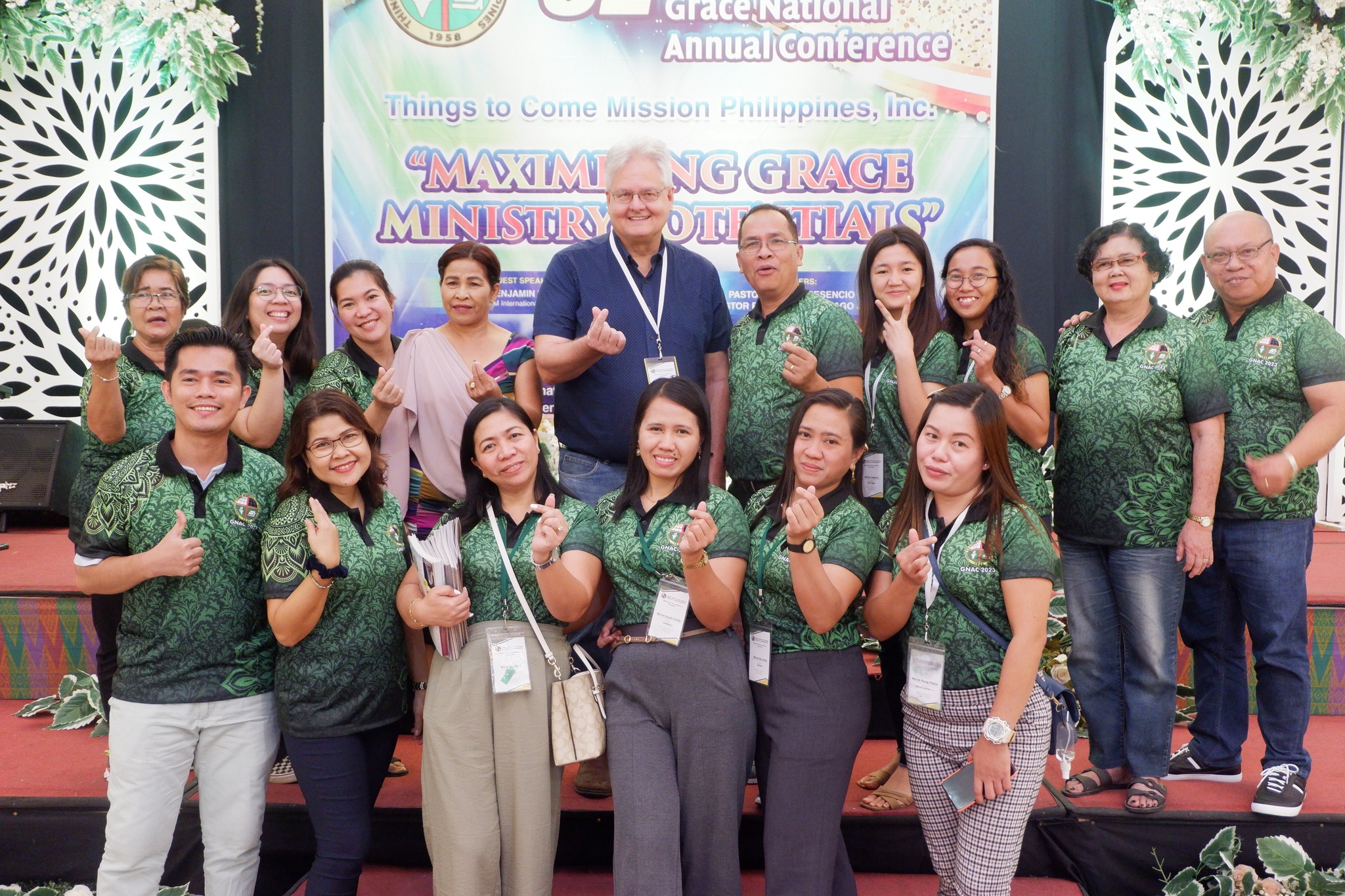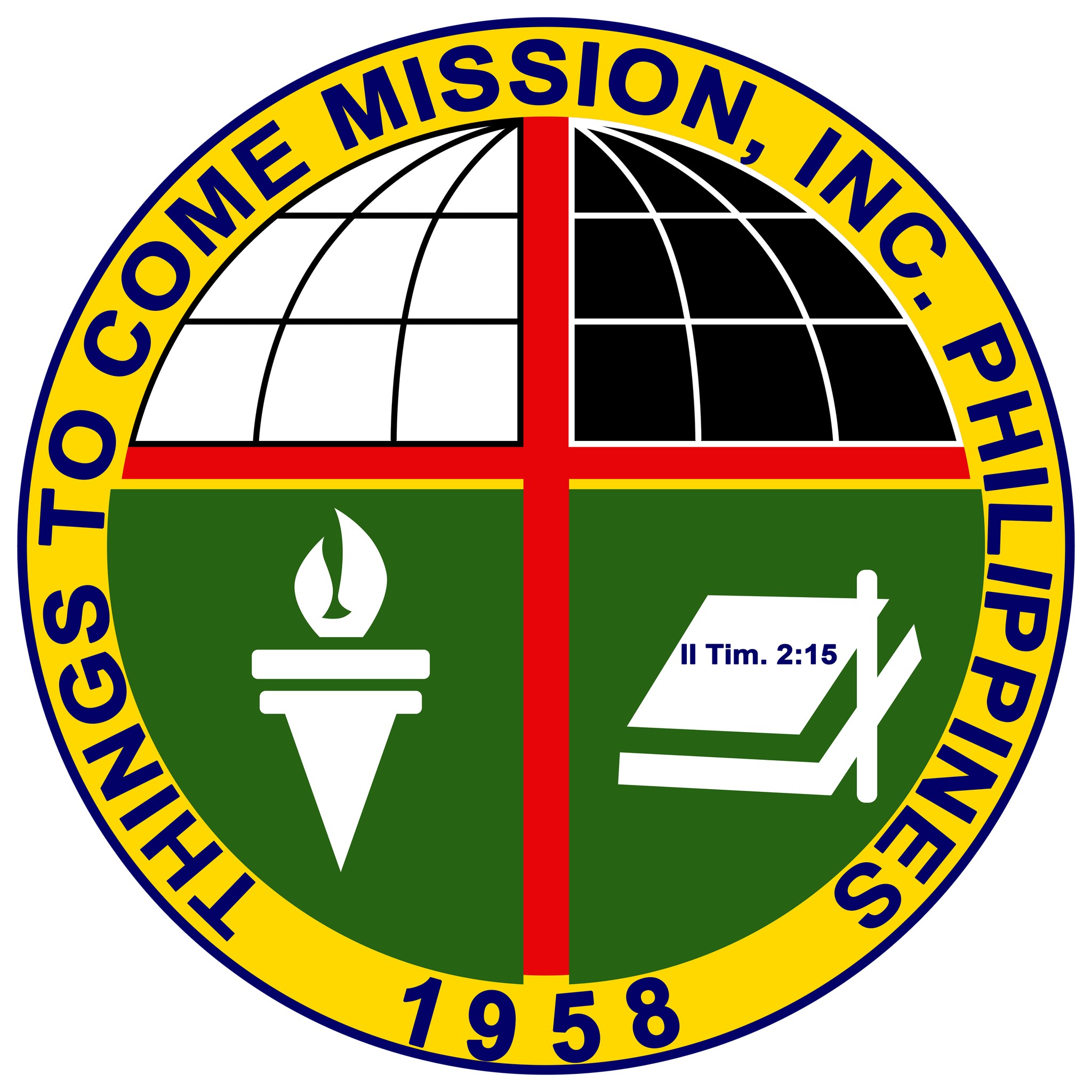About Us

Rightly Dividing the Word of Truth
Welcome to TCM Philippines, a community dedicated to rightly dividing the Word of truth and faithfully following the teachings of Apostle Paul. We are passionate about understanding and applying the Scriptures in a way that honors God and brings transformation to lives.
We believe that the Bible is the inspired Word of God, and we recognize the importance of interpreting it accurately. Following the guidance of Apostle Paul and his emphasis on rightly dividing the Word, we approach the Scriptures with reverence, seeking to understand the different dispensations and the progressive revelation of God’s plan throughout history.
Vision-Mission Statement
“Things to Come Mission, Inc. endeavors to follow the global ministry concerns of the Apostle Paul as he follows Christ. It envisions to establish a Grace Church in every municipality and city in the Philippines, and commits itself to win the lost, edify the saints, plant reproducing Grace Churches, and produce committed believers in the teachings of Grace whose lives are Christ-like in character.”

Core Values
The core values of an organization are those values we hold which form the foundation on which we perform work and conduct ourselves. We have an entire universe of values, but some of them are so primary, so important to us that throughout the changes in society, government, politics, and technology they are STILL the core values we will abide by. In an ever-changing world, core values are constant. Core values are not descriptions of the work we do or the strategies we employ to accomplish our mission. The values underlie our work, how interact with each other, and which strategies we employ to fulfill our mission. The core values are the basic elements of how we go about our work. They are the practices we use (or should be using) every day in everything we do.
As a Christian organization, Things to Come Mission, Inc. subscribes to the following core values:
Competence, Dependence on God, Edification, Efficiency, Evangelism, Godly Leadership, Grace Orientation, Home & World Missions, Integrity, Mobilized Laity, Prayer, Relationships, Stewardship, Teamwork
Doctrinal Statement (What We Believe):
“I therefore, the prisoner of the Lord, beseech you that ye walk worthy of the vocation wherewith ye are called, with all lowliness and meekness, with long-suffering, forbearing one another in love; endeavoring to keep the unity of the Spirit in the bond of peace. There is one body, and one Spirit, even as ye are called in one hope of your calling; one Lord, one faith, one baptism, one God and Father of all, who is above all, and through all, and in you all” (Ephesians 4:1-6).
Desiring to be in full accord with the mind of the Spirit for this present dispensation, we hold and require the following doctrinal beliefs:
The Bible
The entire Bible in its original writings is verbally inspired of God and is of plenary authority (2 Timothy 3:16, 17; 2 Peter 1:21).
The Godhead
There is one God, eternally existing in three Persons: Father, Son, and Holy Spirit (Deuteronomy 6:4; 1 Timothy 2:5; Ephesians 4:4-6; Matthew 28:19; 2 Corinthians 13:14).
The Person of Christ
Jesus was begotten by the Holy Spirit and born of the virgin, Mary, and is true God and true man (Luke 1:35; Philippians 2:6-9; Romans 1:3-4).
Personality and Work of the Holy Spirit
The Holy Spirit is a person Who convicts the world of sin and regenerates, baptizes, identifies, indwells, enlightens, seals, and empowers believers (John 16:8; Titus 3:5; 1 Corinthians 12:13; Ephesians 1:13, 17, 18; 3:16)
Total Depravity
All men by nature, are dead in trespasses and sins and are, therefore, totally unable by their own wisdom and strength to do anything pleasing to God (Ephesians 2:13; Romans 3:9-12; 1 Corinthians 1:18-31).
Salvation (Redemption)
God justifies the ungodly sinners by His grace upon the ground of the shed blood of Christ through the means of faith. This complete salvation is bestowed as a free gift of God apart from man’s works. It is a personal matter, leaving no room for the so-called “social gospel” (Romans 3:24-28; 5:1, 9; Ephesians 2:8-9).
Eternal Security
All the saved are eternally secure in Christ (Colossians 3:1-4; Philippians 1:6; Romans 8:1; 8:29-34, 38-39; John 10:27-29; Ephesians 1:13, 14).
The Church
In the present dispensation there is only one true Church, which is called the Body of Christ (1 Corinthians 12:13; Ephesians 1:22-23; 3:1-6) separate and distinct from the prophesied, earthly kingdom of Christ. The historical manifestation of the Body of Christ began with the Apostle Paul before he wrote his first epistle (1 Thessalonians 2:14-16 cf Acts 13:45-46; Philippians 1:5-6 cf Acts 16:1; 1 Corinthians 12:13, 27 cf Acts 18).
Gifts
The gifts necessary for the ministry of the Body of Christ are those enumerated in Romans 12:3-9 and Ephesians 4:7-16. All the miraculous sign gifts of the Acts period, such as tongues, prophecy and healing (1 Corinthians 12:13, being temporary in character, have ceased (1 Corinthians 13:8-13).
Walk
By reason of Christ’s victory over sin and of His indwelling Spirit, all of the saved may and should experience deliverance from the power of sin by obedience to Rom. 6:11; but we deny that man’s nature of sin is eradicated during this life (Romans 6:6-14; Galatians 5:16-25; Romans 8:37; 2 Corinthians 2:14; 10:2-5). As saints (Lit. “set-apart ones”) and members of the true Church (Lit. “called-out ones”) we are to maintain a Christ-honoring testimony, separate from all forms of worldliness and apostasy, demonstrating obedience to the Lord Jesus Christ and to love all men (Romans 12:2, 9; 2 Corinthians 6:14-18; Ephesians 5:11; 1 Timothy 6:20-21; 1 John 4:19).
Baptism
All saved persons have been made members of the Body of Christ by one divine baptism (1 Corinthians 12:13). By this one baptism every member of the Body of Christ is identified with Christ in His death, burial and resurrection. In the light of the statement concerning the one baptism in Ephesians 4:5, the statements concerning the baptism in Colossians 2:12 and Romans 6:3-, and Paul’s statement in 1 Corinthians 1:17 that “Christ sent me not to baptize, but to preach the gospel,” we affirm that water baptism has no place in God’s spiritual program for the Body of Christ in this day of grace.
The Lord’s Table
The communion of the Lord’s Supper as revealed through the Apostle Paul in 1 Corinthians 11:23-26 is for members of the Body of Christ to observe “until He comes.” It is a memorial of Christ’s death.
Resurrection
Jesus Christ was resurrected bodily from the dead (Luke 24:39-43). Therefore in (1 Corinthians 15:21), all men will have a bodily resurrection (Acts 24:15); the saved to everlasting glory and the unsaved to everlasting punishment (John 5:29; Revelation 20:11-15).
The Rapture and Second Coming of Christ
The rapture of the Church “which is his Body,” and the second coming of Christ will be pre-millennial. He will come first to receive the members of His Body to Himself (1 Thessalonians 4;13-18; Philippians 3:20-21), and later to receive His millennial kingdom, over which he will reign (Zechariah 14:4, 9; Acts 1:10-11; Revelation 19:11-16; 20:4-6). Because of the distinctive nature of the Body of Christ, the resurrection and rapture of the Church, which is His Body, will take place before the great tribulation (Jeremiah 30:7; Matthew 24:15-31) at His appearing in the air (1 Thessalonians 4;123-18; Philippians 3;20-21; Titus 2:13-14; 1 Corinthians 15:51-53). The resurrection of the other saved dead will occur after the tribulation (Revelation 20:4-6).
State of the Dead
Nowhere does the Scripture extend the hope of salvation to the unsaved dead but instead reveals that they will ever continue to exist in a state of conscious suffering (Luke 16:23-28; Revelation 14:11; 20:14-15; Colossians 3:6; Romans 1:21-32; John 3;36; Philippians 3:19; 2 Thessalonians 1:9). The teachings of universalism, of probation after death, of annihilation of the unsaved dead, and of the unconscious state of the dead, saved or unsaved (Luke 16:23-28; Philippians 1:23; 2 Corinthians 5:6-8), are opposed by us as being thoroughly unscriptural and dangerous doctrines.
Mission& Commission
The mission and commission of the Church which is his Body is to proclaim the message of reconciliation (2 Corinthians 5:14-21) and to preach Jesus Christ according to the revelation of the mystery (Romans 16:25; Ephesians 3:8-9; with all boldness. In this we should follow the Apostle Paul (1 Corinthians 4:16; 11:1; Philippians 3:17; 4:9; 1Timothy 1:11-16). That distinctive message which the Apostle of the Gentiles (Romans 11:13; 15:16) calls “my gospel” (Romans 2:16; 16:25) is also called “the gospel of the grace of God” (Acts 20:24). We, like Paul, must preach the entire Word of God in the light of this gospel (2 Timothy 4:2; Galatians 1:8-9) and strive to reach those in the regions beyond where Christ is not yet named (Romans 15:20; 2 Corinthians 10:16).
Visit Our Sermons
Our community makes us unique. They have an energy that reverberates around them. Their mission in life is to ensure the wonder in the world is not overlooked.

Meet Our Board of Directors
Our Directional Leadership Team works together to shape the vision and direction of Find Faith

Rev. Salvador C. Nabus
executive director

Rev. Ronnie C.
Plale
treasurer

Rev. Ariel D. Mahilum

Rev. Vernon P. Batabat
chairman

Rev. Osias T. Cadeliña

Rev. Bernardo P.
Pesidas

Rev. Joed T.
Amlon
secretary

Bro. Benjie M. Cañete


